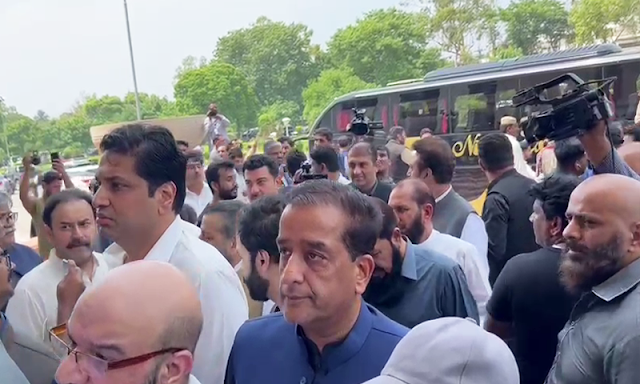کچھ دیر میں ہونے والے اہم وزیراعلیٰ کے انتخاب کے ساتھ قانون ساز پنجاب اسمبلی پہنچ گئے۔
Lawmakers have already begun to arrive at the Punjab Assembly, with some PTI members flashing the victory sign.
The PML-N’s Rana Mashhood, who was speaking to Geo News from a bus on the way to the assembly, claimed that 175 MPAs of the PTI were there at the moment and the PML-N had 180.
There were some other developments as well. The Lahore High Court barred police from entering the assembly, which was requested by deputy speaker Dost Mohammad Mazari over the violence he endured during the April 16 election.
Justice Muzamil Akhtar Shabbir pronounced the verdict on PTI lawmaker Sibtain Khan’s petition, ruling that the can police enter only when the situation goes bad.
Separately, a new provincial police chief was also appointed moments before the session was slated to begin.
The session, which will be chaired by Deputy Speaker Dost Mohammad Mazari, comes a mere three months after incumbent Hamza Shehbaz secured the office on April 16 after garnering 197 votes — including 25 from PTI dissident MPAs — in a gruelling process that was punctuated by delays and violence.
The dissidents’ votes, which were instrumental in putting Hamza in the top seat, began a saga that went from their losing their seats to a Supreme Court interpretation of Article 63-A that retroactively gutted their votes, setting the stage for another election for the provincial chief.
So how did it get to this point?
Read: Tally in Parvez Elahi’s favour as Punjab elects CM today
What has transpired so far
PML-Q is courted by the PTI and opposition as vote of no-confidence brews against Imran Khan
Usman Buzdar steps down as CM to make way for Parvez Elahi as PTI-PML-Q candidate
In a session marred by violence, Hamza is elected Punjab chief minister after garnering votes from 25 PTI dissidents
A reference is filed against the dissidents with the ECP, urging the MPAs removal
They are eventually de-seated for defection, effectively making Hamza lose his majority in the house
Five PTI MPAs are notified on reserved seats
SC orders new election which will be held today
By-elections are held for the 20 general seats, 15 of which go to the PTI
One PTI MPA resigns amid claims of horse-trading
Elahi, who has 187 supporters, is poised for victory, while Hamza has 179
Where do the parties stand now?
While numerically PTI stands at 187 including PML-Q’s seats, the number of votes it has is 186, as Deputy Speaker Dost Mohammad Mazari of the PTI will not cast his vote because he will be presiding over the session. The speaker’s vote is used as a tie-breaker however.
How did all this start?
It started in February, as the vote of no-confidence was taking shape against Imran Khan, the then prime minister.
The PTI was trying to prevent the on-the-fence PML-Q from voting with the opposition, which was courting it.
Eventually, Usman Buzdar, the chief minister at the time, resigned from his seat to make way for Parvez Elahi as the joint PTI-PML-Q candidate.
Come election time, 25 PTI dissidents voted for Hamza. Their were instrumental in helping Hamza over the line; he received a total of 197 votes while 186 votes are required for a simple majority.
Who voted for Hamza?
- Raja Sagheer Ahmed
- Malik Ghulam Rasool Sangha
- Saeed Akbar Khan
- Mohammad Ajmal
- Abdul Aleem Khan
- Nazir Ahmed Chohan
- Mohammad Amin Zulqernain
- Malik Nauman Langrial
- Mohammad Salman
- Zawar Hussain Warraich
- Nazir Ahmed Khan
- Fida Hussain, Zahra Batool
- Mohammad Tahir
- Aisha Nawaz, Sajida Yousaf
- Haroon Imran Gill
- Uzma Kardar
- Malik Asad Ali
- Ijaz Masih
- Mohammad Sabtain Raza
- Mohsin Atta Khan Khosa
- Mian Khalid Mehmood
- Mehar Mohammad Aslam
- Faisal Hayat
What happened next?
Following Hamza’s election, the PTI sent a declaration to Punjab Assembly Speaker Elahi declaring the 25 MPAs as defectors.
Subsequently, Elahi had sent the reference to the ECP, urging it to de-seat these lawmakers for defecting from the PTI by casting their votes in Hamza’s favour in violation of party directions.
Most of the 25 dissident MPAs tried to justify their action of voting in favour of Hamza by claiming that they had received no directives from the party. They raised procedural objections and claimed they never received any show-cause notices — a mandatory requirement.
On May 20, the Election Commission of Pakistan (ECP) de-seated the 25 dissident MPAs, stating that they had defected from the party. Since these lawmakers were no longer members of the House, Hamza lost his majority.
Earlier this month, the Supreme Court ordered the chief minister’s re-election to be held on July 22 (today).
Five MPAs for reserved seats were notified by the ECP on July 6, leaving 20 empty seats. By-elections for the 20 seats were held on July 17 (Sunday) in which the PTI routed the PML-N to bag 15 seats while the latter secured only four seats.
Since the by-election results, the government and opposition have flung allegations and counter-allegations at each other.
The term “horsetrading” has returned to the political discourse amid alleged attempts to woo each other’s MPAs ahead of the crucial CM vote.
With additional reporting by Rana Bilal








0 Comments